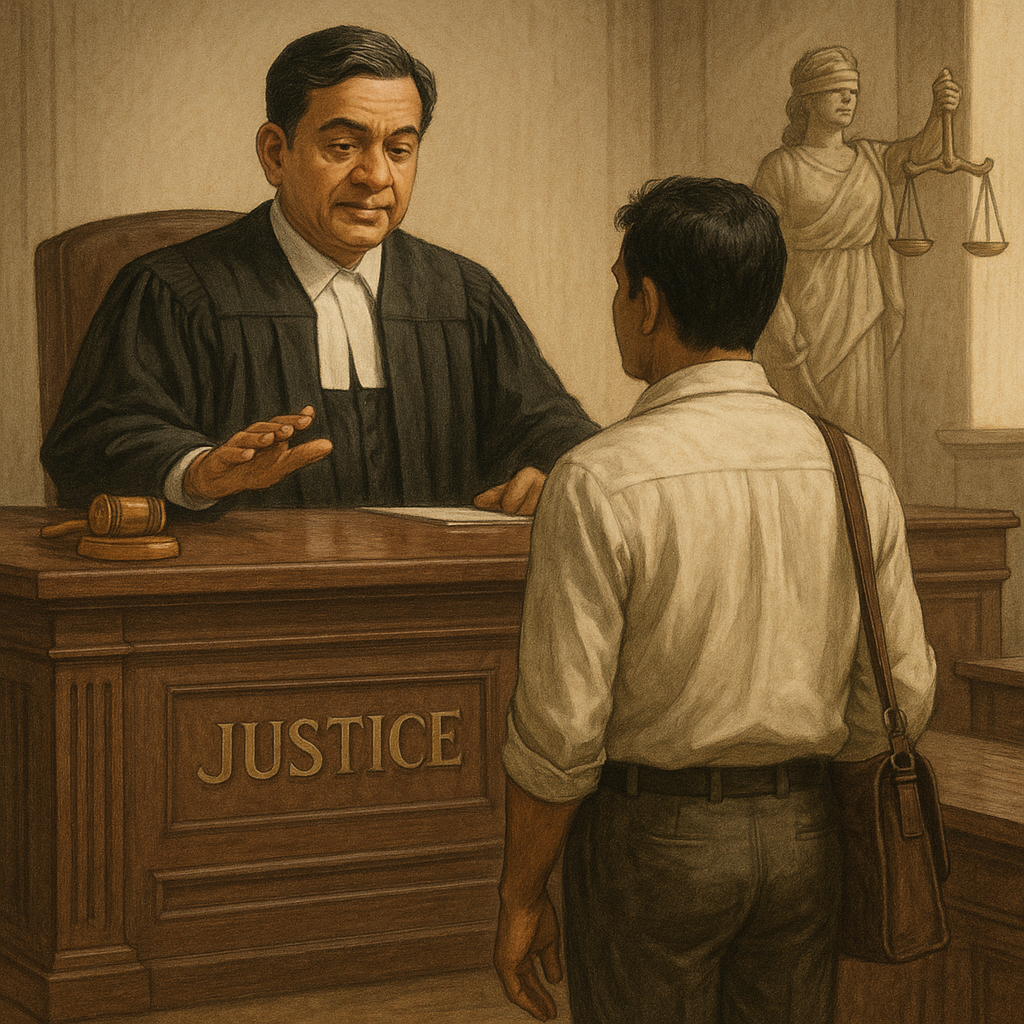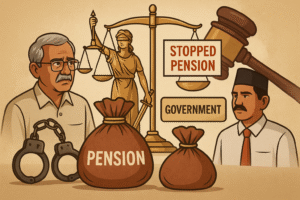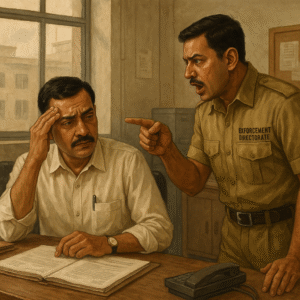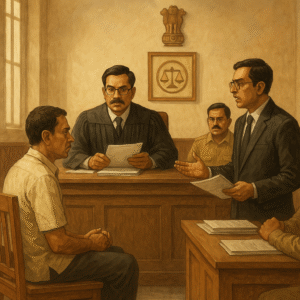The Patna High Court has quashed the dismissal of a government employee from the Co-operative Department, holding that the disciplinary authority violated mandatory procedural safeguards under the Bihar Government Servants (Classification, Control and Appeal) Rules, 2005—especially Rule 18(2). The Court further held that the punishment order and the appellate order were non-speaking and unsupported by evidence, directing reinstatement with all consequential benefits.
The matter arose from a 2011 vigilance trap case in which the employee (then a Lower Division Assistant) was alleged to have demanded illegal gratification. An FIR was registered under the Prevention of Corruption Act; the employee was suspended, later reinstated, and then again placed under suspension when a departmental proceeding was contemplated. A charge memo issued in August 2012 culminated in a full enquiry, after which the Enquiry Officer found that none of the charges were proved. Despite this exoneration, the disciplinary authority issued a second show cause and ultimately dismissed the employee by memo dated 13.05.2014; the service appeal was thereafter rejected by the Principal Secretary in 2015 and again—after a remand by the High Court—in 2019.
In the writ petition (CWJC No. 443 of 2022), the petitioner challenged the dismissal order, the appellate orders, the charge memo, and the second show-cause notice. The Court noted that Rule 17(3)–(4) requires a proper charge memo containing the substance of imputations and a list of documents and witnesses. Here, the charge memo essentially relied on the vigilance material without naming independent documents or witnesses, and there was no demonstration of compliance with the mandatory pre-enquiry process of hearing the delinquent under Rule 17(4).
Crucially, after the Enquiry Officer exonerated the petitioner, the disciplinary authority disagreed and moved straight to impose a major penalty without first recording reasons for disagreement and without affording the petitioner an opportunity to respond to those reasons—both steps being mandatory under Rule 18(2). The Court reproduced Rule 18(2) and emphasized that it is a condition precedent for the disciplinary authority to (i) record reasons for differing with the Enquiry Officer and (ii) record its own findings on the charge based on the evidence on record.
The High Court relied on settled Supreme Court precedent. In Punjab National Bank v. Kunj Behari Misra (1998) 7 SCC 84, the Supreme Court held that when a disciplinary authority proposes to differ with the findings of the Enquiry Officer, it must grant the delinquent an opportunity of hearing before recording a finding of guilt and imposing punishment. A similar view was reiterated in Yoginath D. Bagde v. State of Maharashtra (1999) 7 SCC 739, which recognized that disagreement with the Enquiry Officer’s exoneration requires a fresh opportunity at that stage.
On the evidentiary aspect, the Court underscored that neither documentary nor oral evidence was led to prove the charges during the departmental proceedings; reliance on the FIR or vigilance papers, without more, is inadequate. Citing Roop Singh Negi v. Punjab National Bank (2009) 2 SCC 570, the Court reiterated that an FIR is not evidence in a disciplinary enquiry unless proved through witnesses; mere production of documents does not prove their contents. The Court also referred to State of Uttaranchal v. Kharak Singh (2008) 8 SCC 236 on the need to conduct enquiries bona fide—first leading department’s evidence, permitting cross-examination, and then calling the delinquent to respond.
Parity also influenced the Court’s evaluation. A co-employee (another Assistant) faced identical charges arising from the same vigilance trap, was exonerated by the Enquiry Officer, yet dismissed in the same fashion. In that co-employee’s writ (CWJC No. 11695 of 2018), the High Court had already set aside the dismissal for the same non-compliance with Rule 18(2) and want of evidence. The present judgment drew support from that earlier decision to demonstrate the systemic infirmities in how the disciplinary authority proceeded.
Ultimately, the Court set aside the dismissal order (Memo No. 2623 dated 13.05.2014) and both appellate orders (including the fresh order dated 15.04.2019, communicated via Memo No. 1732 dated 03.05.2019), directing reinstatement with all consequential benefits within twelve weeks from receipt/production of the High Court order. Importantly, the Court clarified that this reinstatement would not preclude the authorities from taking action depending on the outcome of the pending vigilance criminal case. The writ petition was allowed.
Significance or Implication of the Judgment
This decision provides clear guidance to disciplinary authorities across Bihar on three fronts:
• Natural Justice at the “disagreement” stage: When an Enquiry Officer exonerates an employee, a disciplinary authority cannot substitute its own view and punish without first recording reasons for disagreement and giving the employee an opportunity to respond to those reasons. This is not a technicality; it is a mandatory safeguard under Rule 18(2) and rooted in Supreme Court precedent.
• Proof, not presumption: Departmental findings cannot rest on the FIR or vigilance notes alone. The department must lead evidence, allow cross-examination, and prove documents through witnesses before any penalty is imposed. This protects both administrative fairness and the credibility of anti-corruption efforts.
• Reasoned orders: Both disciplinary and appellate orders must demonstrate application of mind, discuss the employee’s explanation, and explain why the Enquiry Officer’s conclusions are being rejected. Non-speaking orders do not pass judicial scrutiny.
For government departments, this judgment encourages robust, evidence-based proceedings that can withstand judicial review. For public employees, it reaffirms that exoneration by an Enquiry Officer has real procedural value: if the authority wishes to disagree, it must do so transparently, with reasons and notice. The Court’s reinstatement direction, coupled with liberty to act after the criminal trial, also strikes a balance between service law fairness and the State’s interest in pursuing corruption cases.
Legal Issue(s) Decided and the Court’s Decision with Reasoning
• Whether a disciplinary authority can impose a major penalty after an Enquiry Officer’s exoneration without recording reasons for disagreement and without giving a fresh opportunity to the employee — Held: No. Rule 18(2) mandates recording reasons and findings if disagreeing, and Supreme Court precedent (Kunj Behari Misra; Yoginath D. Bagde) requires an opportunity before reversing an exoneration.
• Whether reliance solely on an FIR/vigilance materials, without examining witnesses or proving documents, suffices to sustain a dismissal — Held: No. FIR is not substantive evidence in disciplinary proceedings; documents must be proved and witnesses examined (Roop Singh Negi).
• Whether failure to follow the sequential steps of a bona fide enquiry (department first leads evidence, delinquent can cross-examine, then respond) vitiates the proceedings — Held: Yes, as per Kharak Singh principles.
• Whether non-speaking dismissal and appellate orders are sustainable — Held: No; absence of reasons and non-consideration of the employee’s explanation render the orders unsustainable.
• Whether parity with a co-delinquent (facing identical facts and legal infirmities) supports interference — Held: Yes; the Court referred to its own earlier decision (CWJC No. 11695 of 2018) setting aside a like dismissal.
Judgments Referred by Parties
• Punjab National Bank & Ors. v. Kunj Behari Misra, (1998) 7 SCC 84.
• Roop Singh Negi v. Punjab National Bank & Ors., (2009) 2 SCC 570.
Judgments Relied Upon or Cited by Court
• Punjab National Bank & Ors. v. Kunj Behari Misra, (1998) 7 SCC 84.
• Yoginath D. Bagde v. State of Maharashtra & Anr., (1999) 7 SCC 739.
• Roop Singh Negi v. Punjab National Bank & Ors., (2009) 2 SCC 570.
• State of Uttaranchal & Ors. v. Kharak Singh, (2008) 8 SCC 236.
Case Title
Ravi Kumar v. State of Bihar & Ors. (Patna High Court)
Case Number
Civil Writ Jurisdiction Case No. 443 of 2022.
Citation(s)
2025 (1) PLJR 590
Coram and Names of Judges
Hon’ble Mr. Justice Harish Kumar (CAV Judgment dated 07.01.2025).
Names of Advocates and who they appeared for
• Mr. Purushottam Kumar Jha — for the petitioner.
• Mr. Uday Shankar Sharan Singh, GP-19 — for the State.
Link to Judgment
MTUjNDQzIzIwMjIjMSNO-qjsqPrXSeJM=
If you found this explanation helpful and wish to stay informed about how legal developments may affect your rights in Bihar, you may consider following Samvida Law Associates for more updates.








